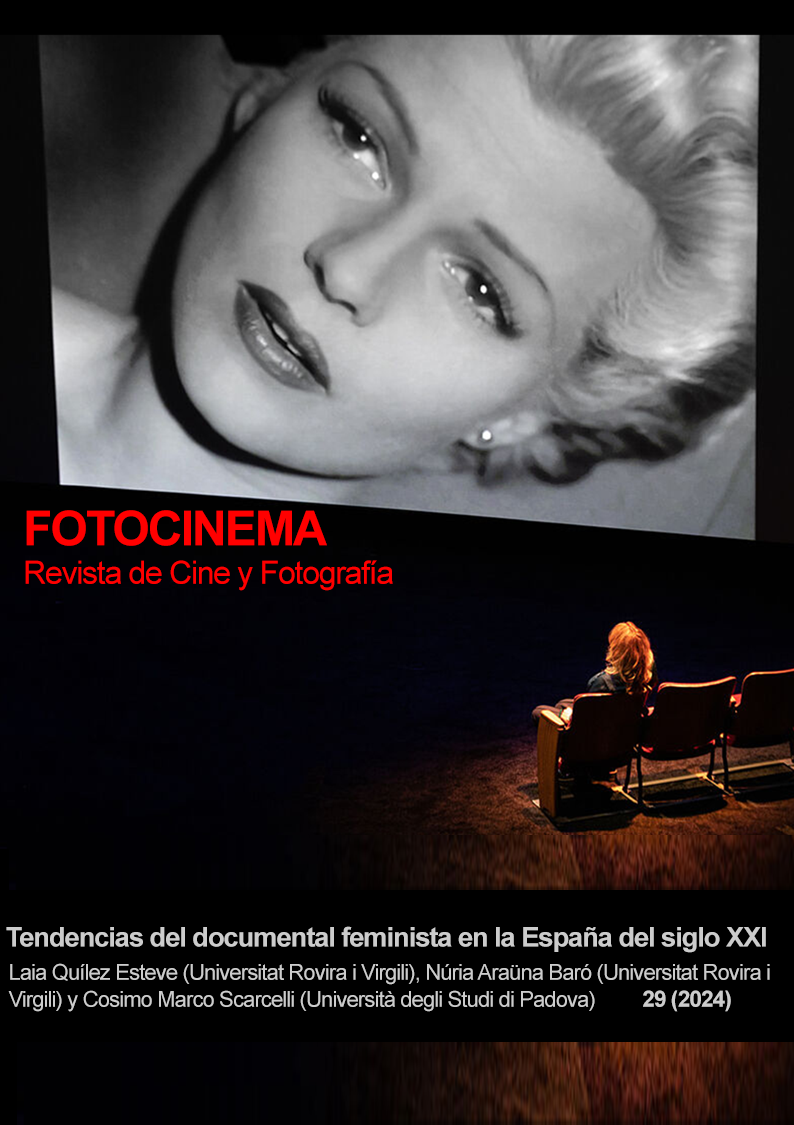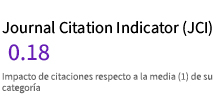Family music documentary film as a tool for a feminist memory. Analysis of Conxita Badia no existeix
DOI:
https://doi.org/10.24310/fotocinema.29.2024.19619Keywords:
family documentary; music documentary; memory; feminist genealogyAbstract
Although the documentary genre has proliferated approaches to memory practices from the family sphere, narrated in the first person and from a gender perspective, it is not usual for music documentaries. Conxita Badia no existeix (Eulàlia Domènech, 2012) is one of these rare examples. In it, the director pays tribute to and vindicates the musical legacy of her great-grandmother, the lyric singer Conxita Badia, who, despite her talent and the international fame she achieved in the first half of the 20th century, was made invisible by official history and is, today, unknown to the general public. This article focuses on the narrative and film strategies used by Domènech in this work, which seek to privilege listening to the artist's voice. On the other hand, through the female family protagonist relationship established throughout the film, the article emphasises the importance of rescuing from oblivion and vindicating past female figures, understanding memory as a political exercise of rewriting a patriarchal history, contributing its grain of sand in the construction of a feminist genealogy, in this case, in the field of classical music.
Downloads
Metrics
Publication Facts
Reviewer profiles N/A
Author statements
Indexed in
-
—
- Academic society
- N/A
- Publisher
- Universidad de Málaga
References
Araüna, N. (2021). Estrategias para una memoria feminista en el documental contemporáneo producido en España. En M. Sánchez y M. Del Moral (Coords.), Género e Historia Pública. Defendiendo el pasado de las mujeres (pp. 175-196). Comares.
Baudrillard, J. (1994). The System Collecting. En J. Elsner, R. Cardinal (Eds.), The Cultures of Collecting (pp. 7-24). Harvard University Press.
Beattie, K. (2005). It’s Only Rock and Roll: ‘Rockumentary’, Direct Cinema, and Performative Display. Australasian Journal of American Studies, 24(2), 21-41.
Berger, J. (1997). Ways of Remembering. En J. Evans (Ed.), The Camerawork Essays: context ans Meaning in Photography (pp. 41-51). Rivers Oram Press.
Castejón, M. (2012). Mujeres directoras de cine. Entre el cine de mujeres y el punto de vista de género. En M. Castejón Elorza (Ed.), 25 años de cine. Muestra Internacional de Cine y Mujeres de Pamplona (pp. 11-21). IPES Elkartea.
Citron, M. J. (1993). Gender and the Musical Canon. Cambridge University Press.
Cruz, A. (2019). La brecha de género en la música professional. Aránzazu Cruz. https://acortar.link/eWpSKH
del Pino, R. (1 de mayo de 2005). Conchita Badía, en el recuerdo. Una voz para Granados, Casals y Falla. La Opinión de Granada. https://acortar.link/yBW84e
Gan Quesada, G. (2012). Músicas para después de una guerra…Compromisos, retiradas y resistencias en la creación musical catalana del primer franquismo. En P. Ramos López (Ed.), Discursos y prácticas musicales nacionalistas (1900-1970) (pp. 277-299). Universidad de La Rioja.
García-Ramos, F. y Domínguez Goñi, V. (2023). Discursos y representaciones de la mujer compositora en el cine: el caso de Clara Wieck. Fotocinema, 26, 383-413. https://doi.org/10.24310/Fotocinema.2023.vi26.15560
Goldin, C. y Rouse, C. (2000). Orchestrating Impartiality: The Impact of “Blind” Auditions on Female Musicians. The American Economic Review, 90(4), 715-741.
Gómez Tarín, F. J. y Marzal Felici, J. (2006). Una propuesta metodológica para el análisis del texto fílmico. En Actas del III Congreso de la Asociación Cultural Trama y Fondo. https://acortar.link/1ULzI0
Hirsch, M. (1997). Family Frames: Photography, Narrative, and Postmemory. Harvard University Press.
Hirsch, M. (2012). The Generation of Postmemory. Writing and Visual Culture After the Holocaust. Columbia University Press.
Janata, P., Tomic, S. T. y Rakowski, S. (2007). Characterisation of music-evoked autobiographical memories. Memory, 15(8), 845-860.
Jäncke, L. (2008). Music, memory and emotion. Journal of Biology, 7, 21.
Kvale, S. (2011). Las entrevistas en Investigación Cualitativa. Ediciones Morata.
Lagos, P. (2011). Ecografías del “Yo”: documental autobiográfico y estrategias de (auto)representación de la subjetividad. Comunicación y Medios, 24, 60-80.
López-Peláez, M. P. (2013). Una breve aproximación al canon musical en la educación desde una perspectiva de género. Sophia, 9, 213-220.
Manchado, M. (25 de juliol de 2020). En busca de una genealogía feminista en la música española. Revista con la A. https://acortar.link/fPMngL
Mauri, D. (2023). Aproximacions al documental de música contemporani amb perspectiva de gènere: visibilització, memòria, reivindicació i llegat [Tesis doctoral, Universitat Rovira i Virgili].
https://www.tesisenred.net/handle/10803/688658
Mayer, S. (2011). Cambiar el mundo, film a film. En S. Mayer i E. Oroz (Eds.), Lo personal es político, Feminismo y documental (pp. 12-42). Gobierno de Navarra, INAAC.
Meléndez, A. (2022). Estirando el cordón: documental autobiográfico y vínculo materno en Stories we tell, hija, Amazona y Look at us nouw, mother!, Fotocinema, 24, 439-463. https://doi.org/10.24310/Fotocinema.2022.vi24.13731
Muxel, A. (2012). The Functions of Familial Memory and Processes of Identity. En E. Boesen, F. Lentz, M. Margue, D. Scuto y R. Wagener (Eds.), Peripheral Memories: Public and Private Forms of Experiencing and Narrating the Past (pp. 21-32). Transcript Verlag.
Odin, R. (2007). El film familiar como documento. Enfoque semiopragmático. Archivos de la filmoteca: revista de estudios históricos sobre la imagen, 57-58(2), 197-217.
Oroz, E. (2012). Los documentales feministas de Kim Longinotto. Subjetividad, compromiso y cambio. En M. Castejón Elorza (Ed.), 25 años de cine. Muestra Internacional de Cine y Mujeres de Pamplona (pp. 22-33). IPES Elkartea.
Ortega, M. L. (2007). Espejos rotos. Aproximaciones al documental norteamericano contemporáneo. Ocho y Medio.
Quílez, L. (2013). Memorias protésicas: Posmemoria y cine documental en la España contemporánea. Historia y Comunicación Social, 18, 387-398.
Selva, M. (2005). Desde una mirada feminista: los nuevos lenguajes del documental. En C. Torreiro y J. Cerdán (Eds.), Documental y Vanguardia (pp. 65-84). Cátedra.
Sontag, S. (2005). On Photography. RosettaBooks.
Vila, F. (1999). Genealogías feministas. Contribuciones de la perspectiva radical a los estudios de las mujeres. Política y Sociedad, 32, 43-51.
Zunzunegui, S. (2007). Acerca del análisis fílmico: el estado de las cosas. Comunicar, XV (29), 51-58.
Downloads
Published
How to Cite
Issue
Section
License
Copyright (c) 2024 David Mauri

This work is licensed under a Creative Commons Attribution-NonCommercial-NoDerivatives 4.0 International License.
All contents published in Fotocinema Revista científica de cine y fotografía are protected under the Creative Commons Attribution-NonCommercial-ShareAlike 4.0 International (CC BY-NC-SA 4.0) license. All about this license is available in the following link: <http://creativecommons.org/licenses/by-nc-sa/4.0>
Users can copy, use, redistribute, share and exhibit publicly as long as:
- The original source and authorship of the material are cited (Journal, Publisher and URL of the work).
- It is not used for comercial purposes.
- The existence of the license and its especifications are mentioned.
There are two sets of authors’ rights: moral and property rights. Moral rights are perpetual prerogatives, unrenounceable, not-transferable, unalienable, imprescriptible and inembargable. According to authors’ rights legislation, Fotocinema. Revista científica de cine y fotografía recognizes and respects authors moral rights, as well as the ownership of property rights, which will be transferred to University of Malaga in open access. The property rights are referred to the benefits that are gained by the use or the dissemination of works. Fotocinema. Revista científica de cine y fotografía is published in an open access form and it is exclusively licenced by any means for doing or authorising distribution, dissemination, reproduction, , adaptation, translation or arrangement of works.
Authors are responsable for obtaining the necessary permission to use copyrighted images.














13.png)



